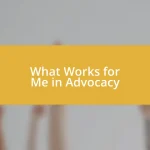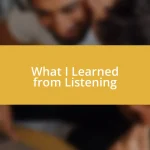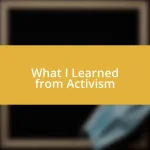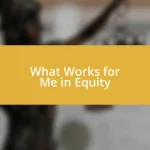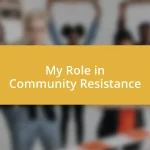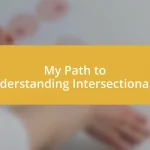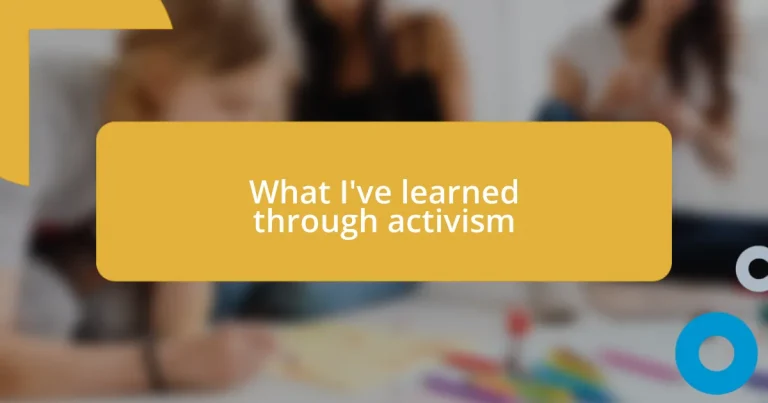Key takeaways:
- Activism fosters awareness and connection to values, driving collective efforts for social change.
- Effective communication, including active listening and storytelling, is essential for engaging diverse audiences.
- Building a supportive community enhances resilience and encourages individuals to persevere through challenges.
- Maintaining long-term commitment involves reconnecting with personal motivations and celebrating small victories in the journey.
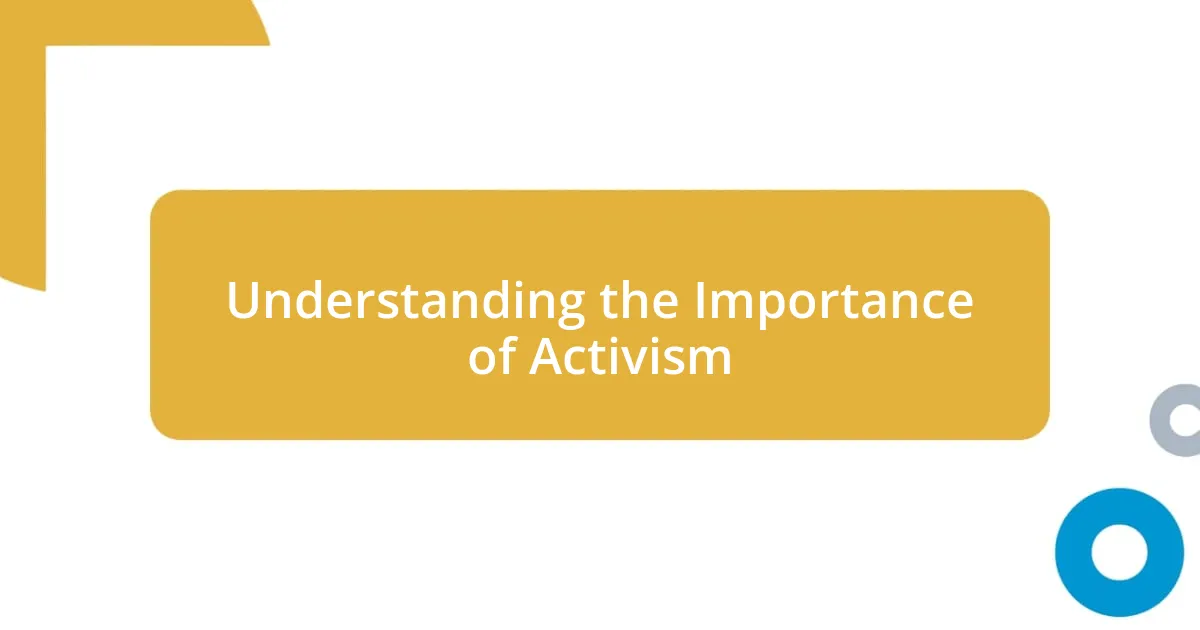
Understanding the Importance of Activism
Activism serves as a powerful catalyst for change, igniting awareness of pressing social issues. I remember attending a local rally where passionate voices echoed the urgency of climate action. Watching people unite for a common cause, I couldn’t help but wonder: how many of us truly understand the impact our collective efforts can have on our communities and our planet?
Through my experiences, I’ve learned that activism isn’t just about making noise; it’s about creating a deep connection to our values. One day, while volunteering at a shelter, I felt a profound sense of purpose when I saw the difference our small actions made in someone’s life. It made me realize that every step we take, no matter how small, contributes to a larger movement for justice and equality.
The importance of activism also lies in its ability to educate and inspire others. Have you ever shared your experiences and seen someone’s perspective shift? I recall discussing social inequality with friends; the conversation opened their eyes to issues they hadn’t considered before. That exchange not only deepened our connection, but it also emphasized that activism can be a gateway for understanding and empathy in our relationships.
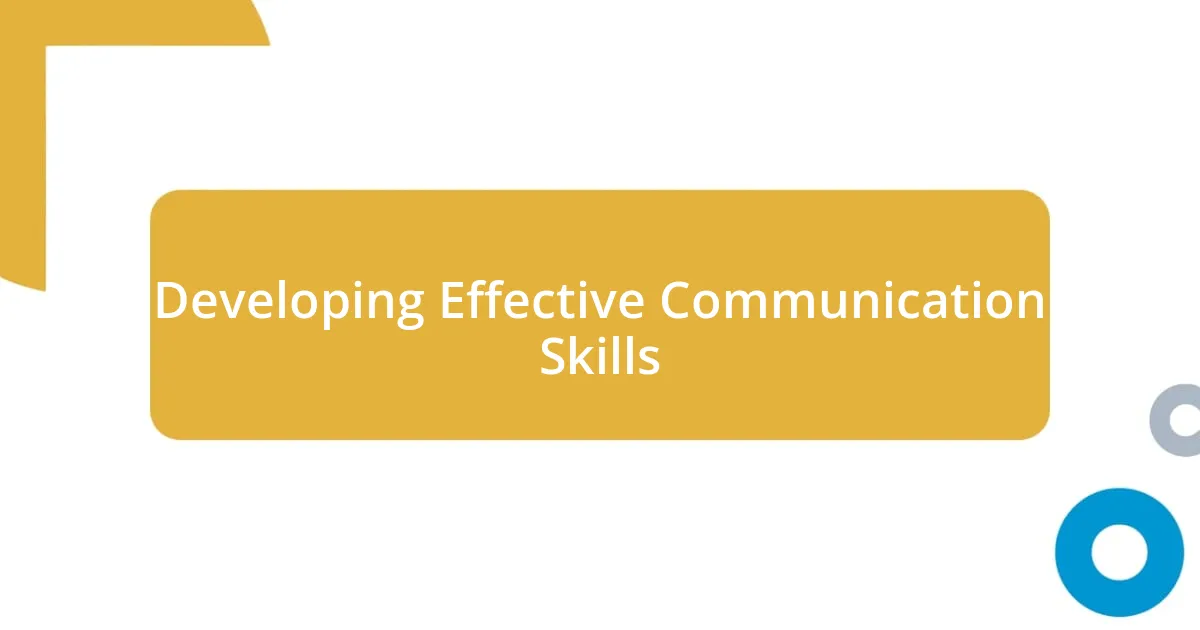
Developing Effective Communication Skills
Effective communication is at the heart of activism. I remember the first time I spoke at a community meeting; my heart raced as I shared my thoughts about local environmental issues. That experience taught me that clarity and passion in speaking can inspire others to join the cause. It’s about translating complex ideas into relatable messages that resonate with different audiences.
Here are some key strategies I’ve found helpful in developing effective communication skills in activism:
- Active Listening: Engaging with others’ perspectives makes them feel valued and fosters a meaningful dialogue.
- Storytelling: Sharing personal experiences can create powerful emotional connections that encourage empathy.
- Simplifying Concepts: Breaking down complex issues into digestible pieces ensures your message is accessible to everyone.
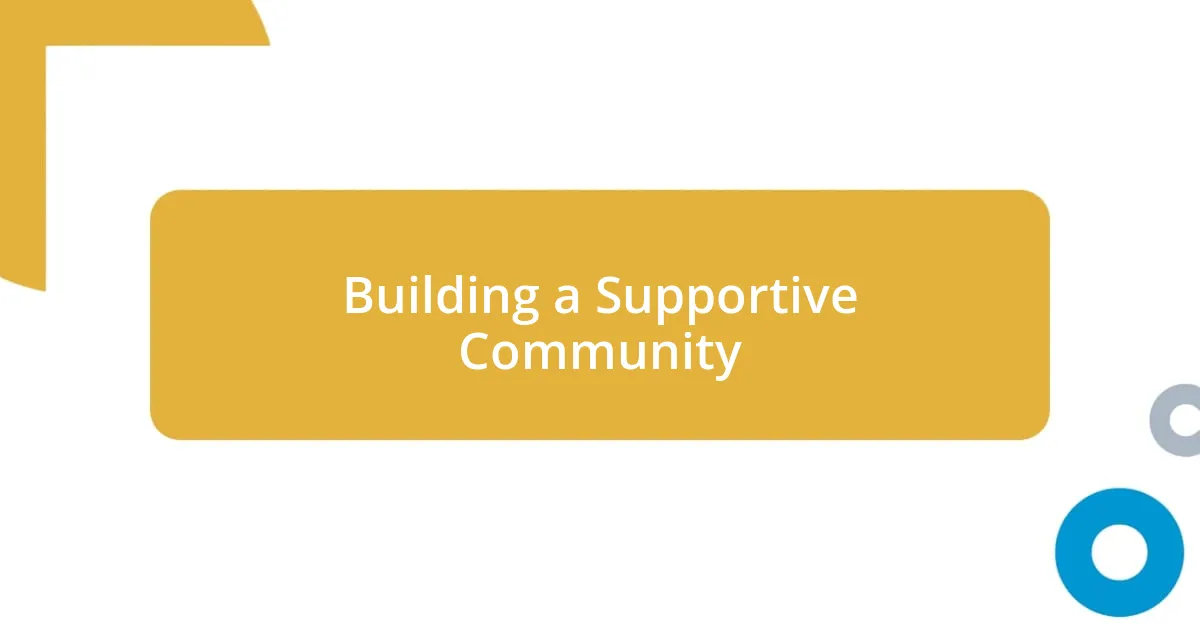
Building a Supportive Community
Building a supportive community is crucial in the world of activism. I vividly recall the warmth I felt attending a local support group where everyone shared their experiences and feelings about a shared cause. It was this environment of understanding that propelled me to open up about my own journey and fears. When we connect on a personal level, we not only cultivate compassion but also strengthen our collective resolve.
The essence of a supportive community lies in its diversity. Each member brings unique perspectives and talents that enrich our activism. I’ve engaged with artists who use their creative expressions to communicate messages and technologists who develop digital tools to mobilize our efforts. It’s a beautiful synergy; when we appreciate what each person contributes, it enhances our collective impact and fosters an environment where everyone feels included and empowered.
Being part of a supportive community has taught me resilience. There were times I felt overwhelmed by the challenges we faced. Yet, it was the encouragement from my peers that motivated me to keep pushing forward. I recall one afternoon, after a particularly tough week, a fellow activist texted me, simply saying, “We’re in this together.” That small reminder was enough to reignite my passion and commitment to our cause, reinforcing that our unity is our strength.
| Key Element | Description |
|---|---|
| Empathy | Understanding and sharing the feelings of others fosters deeper connections. |
| Diversity | Valuing different perspectives enhances creativity and problem-solving. |
| Encouragement | Support from peers helps individuals overcome challenges and remain committed. |
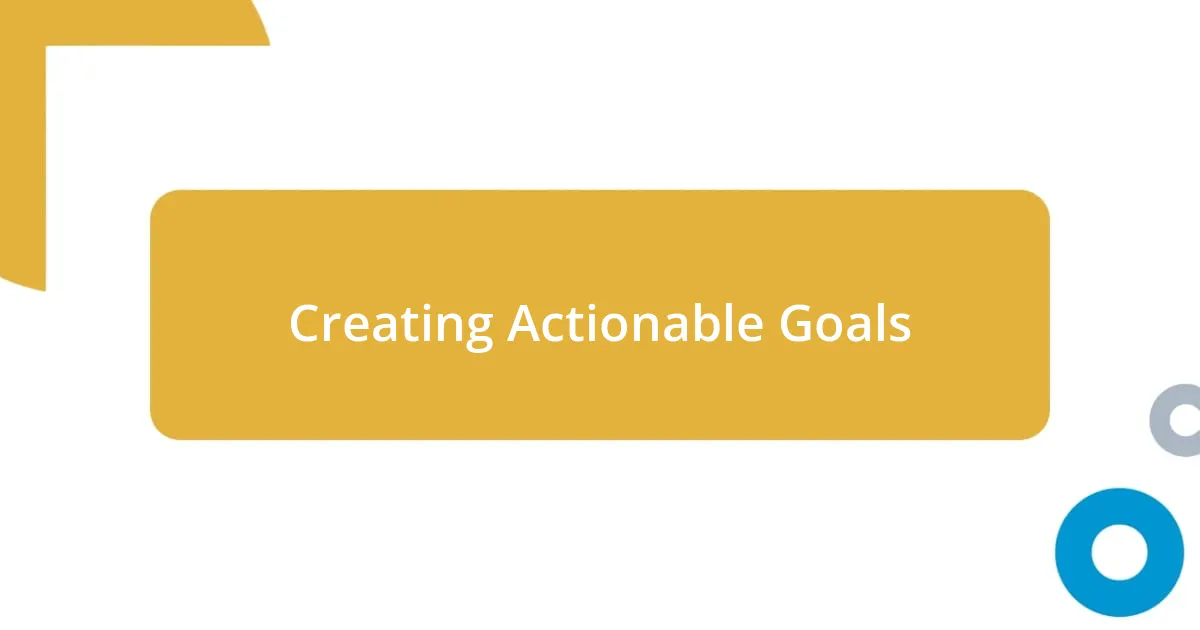
Creating Actionable Goals
Creating actionable goals in activism is a crucial step in translating passion into real-world change. I’ve often found myself stuck, feeling overwhelmed by the enormity of the issues we tackle, but breaking down these challenges into smaller, actionable steps makes things manageable. For instance, during a campaign on plastic pollution, I set a goal to organize a beach cleanup every month. Not only did this provide a clear action point, but it also helped rally others around a tangible effort where we could all see immediate results.
Being specific in goal-setting has made a significant difference in my activism journey. Instead of vague ambitions like “help the environment,” I started to define measurable outcomes, like reducing plastic waste by 50% in our local community. Setting such specific targets creates a sense of accountability. I recall how thrilling it felt when we achieved our cleanup goals and saw a visible difference in our beach—those moments fuel the fire in our collective efforts!
Creating a timeline for these goals is equally important. I learned the hard way that without deadlines, even the best intentions can fall by the wayside. When planning our educational workshops about sustainable practices, establishing a schedule not only helped us stay focused but also motivated everyone involved. Seeing the progress week by week, I couldn’t help but feel a mix of pride and excitement as we worked together toward a brighter, more sustainable future. What strategies have you found effective in your activism goals?
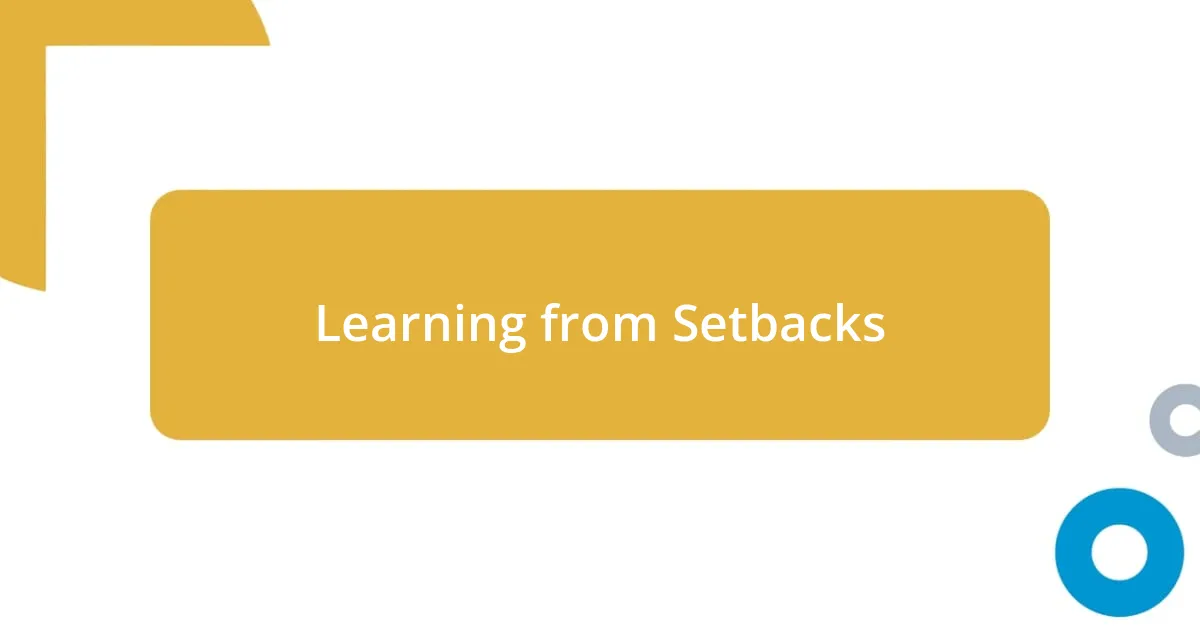
Learning from Setbacks
Learning from setbacks is an essential part of the activism journey. I remember a particular campaign I worked on that had such high hopes, but we faced unforeseen obstacles that derailed our plans. Initially, this felt like a crushing blow, but it made me reflect on the importance of adaptability. Embracing the idea that setbacks aren’t failures but opportunities for growth shifted my perspective entirely.
During one campaign, we aimed to mobilize a large community gathering, but the turnout was dishearteningly low. Instead of dwelling on the disappointment, I took a step back and asked what we could learn from it. Conversations with those who did attend revealed valuable insights—many felt disconnected from the event’s messaging. This experience taught me that listening is just as vital as action; sometimes, our biggest setbacks provide the most profound lessons.
I’ve also realized that setbacks often reveal the strength of our support networks. Reflecting on moments when I felt alone, I found that my community was always ready to uplift me. One of my friends once sent me a message after an event that didn’t go as planned, saying, “Just because we stumbled doesn’t mean we can’t keep running.” That simple reminder of our shared journey not only reinforced my faith in our cause but also highlighted the resilience that can emerge from collective struggles. How have your own setbacks shaped your understanding of activism?
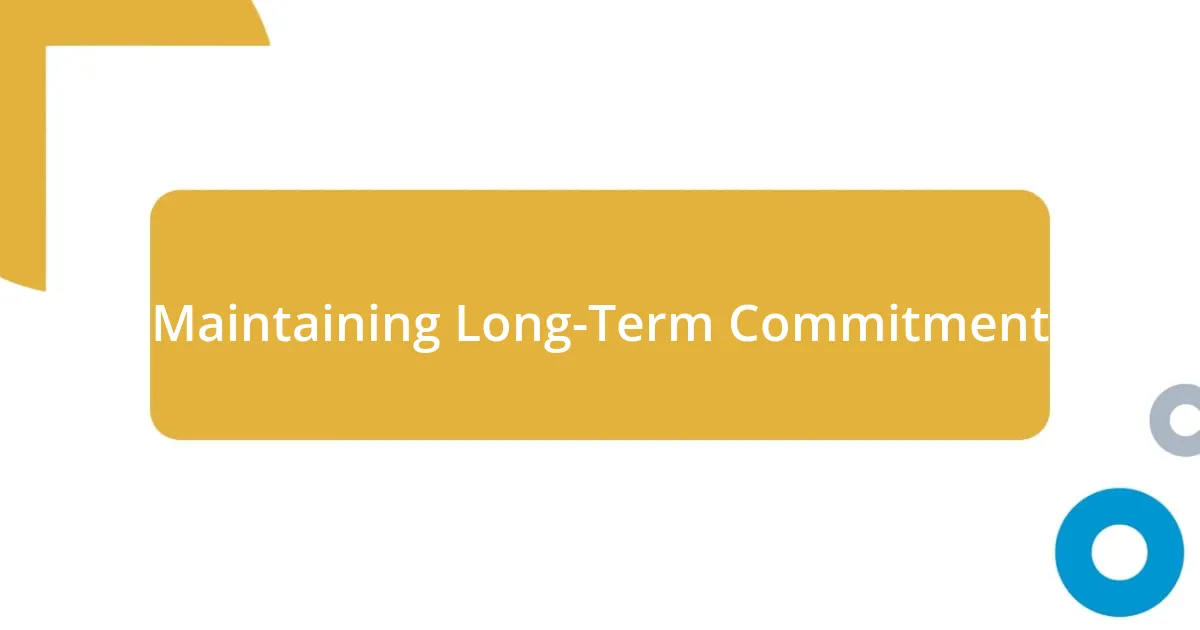
Maintaining Long-Term Commitment
Maintaining long-term commitment in activism can sometimes feel like an uphill battle, especially when the initial excitement fades. I recall a time when I joined a long-term project focused on environmental education in schools. As the months went by, it became challenging to keep my energy up and stay motivated, but I learned that consistently reconnecting with my “why” helped reignite my passion. For me, it meant remembering the joy I felt seeing kids warmly engage with lessons on sustainability—a reminder that our efforts truly made a difference.
I’ve found that building a community of like-minded individuals has been invaluable in fostering my commitment. When I regularly surrounded myself with passionate activists, their energy often spilled over into my own endeavors. I remember a group chat where we’d share successes and hurdles; it turned into a platform for encouragement that kept our spirits high. Have you ever experienced the power of camaraderie in your activist efforts? Those shared moments reaffirmed that the fight for change is not a solitary journey but one filled with support and shared vision.
Adapting my expectations has also played a pivotal role in maintaining my activism commitment. Early on, I would become discouraged if progress felt slow or unsteady. However, I learned to celebrate small victories, whether it was influencing a single student’s perspective or successfully engaging a local business in sustainable practices. Those small wins have a way of reminding me that even incremental changes contribute to the bigger picture. How do you cultivate patience in your activism? Embracing the process, rather than fixating solely on the end goal, has transformed my journey into one that is both meaningful and long-lasting.
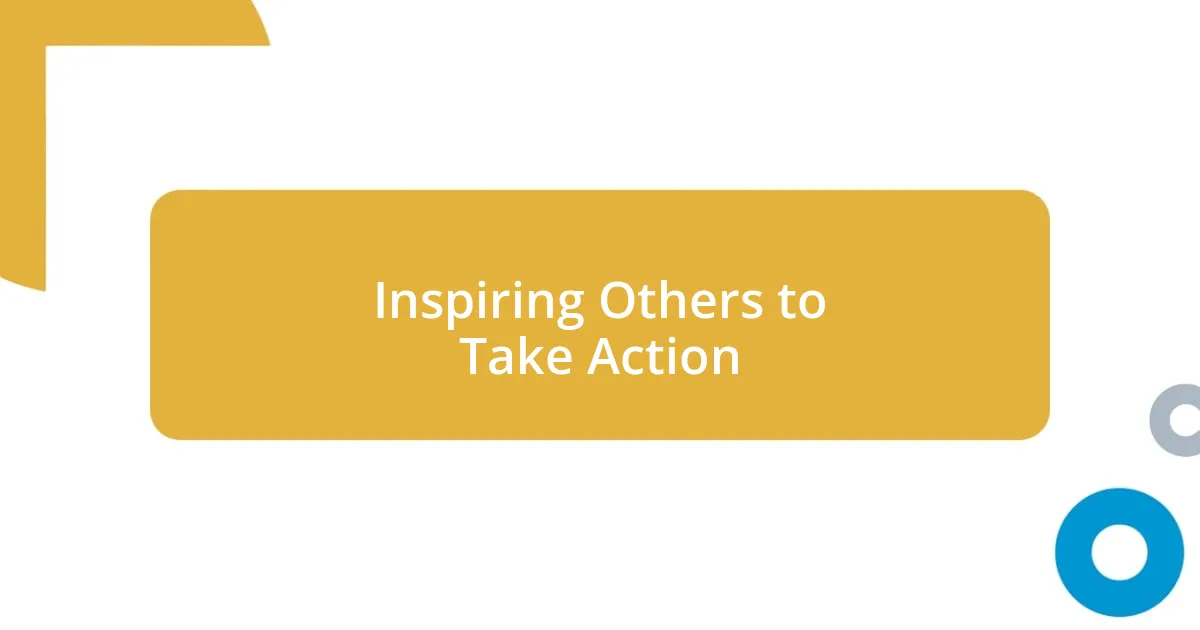
Inspiring Others to Take Action
When it comes to inspiring others to take action, I’ve found that personal stories resonate deeply. I remember hosting a local workshop focused on social justice, and while I prepared extensively, I felt uncertain about whether attendees would connect with the content. To my surprise, when I shared my own journey, including struggles and victories, I noticed participants nodding along. It was in that moment, seeing their engagement, that I realized narratives create a powerful bridge between us. Have you ever felt a spark ignite in you after hearing someone share their truth? That common humanity can motivate others to step up.
Another avenue for inspiration is leading by example. I often think back to a time when I organized a volunteer day for a community clean-up. Initially, we were only a handful of people, but as we worked together, passersby started joining in. Witnessing our efforts fueled their interest and showed them the importance of stepping up—not just in words but in action. It reinforced my belief that action can be contagious. Have you ever seen someone else’s dedication push you to join in? Showing the impact of our actions encourages others to take that first step and participate.
Lastly, I’ve learned that acknowledging and celebrating others’ efforts can amplify motivation. During a recent campaign, I made it a point to highlight individual contributions through social media shout-outs. One local activist, who typically shied away from the spotlight, sent me a heartfelt message expressing how appreciated they felt. Hearing that my words encouraged them to continue their work reminded me that recognition can be a powerful catalyst for action. How do you celebrate the achievements of those around you? In a world where so much can feel discouraging, small gestures like this can ignite a flame in others, inspiring them to join the fight.
